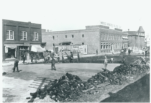City to test drinking water for asbestos residue
By COLLIN GALLANT on April 8, 2023.
cgallant@medicinehatnews.com@CollinGallant The City of Medicine Hat will test drinking water at six locations across the city for asbestos residue that may have leached out of older pipe made by combining the known carcinogen and concrete. Thursday’s meeting of the infrastructure committee heard in response to national media reports outlining its use in major cities, local water officials will sample, test and publish results even though it is not required of utilities in Canada. “And our peers don’t do it, but we will start testing for asbestos next week,” said Pat Bohan, the city’s director of infrastructure assets. “We recognize the community concern.” In late March, CTV investigative program, W5, examined the prevalence of the composite pipe in major centres, finding most have a relatively large amount, including Medicine Hat. Here, about one third of the city’s drinking water system is asbestos-concrete pipe. Health Canada does not have standard limits for the substance in drinking water, stating inconclusive results on the health risks of ingesting, rather than inhaling the fibres. Regulators in the United States and the European Union do set limits. Coun. Robert Dumanowski told the committee the city has a duty to ensure the safety of the water supply and a duty to prove that to residents. “In the end it’s about understanding the issue,” he said. “I’m confident in our staff. Our mission is healthy water for our community. This is a good step.” The city already conducts 19,000 tests per year on water samples for issues such as chlorine levels, or the presence of E.coli bacteria, microplastic and more than 400 different chemical compounds. “There’s an unbelievable amount of assessment going on,” said Bohan. “We operate in strict compliance and operators take it very, very seriously.” Bohan also laid out the makeup of Medicine Hat’s 435 kilometre potable water distribution network in a presentation that may be posted on the city’s website. About half the system is heavy plastic “PVC” pipe, which is now used in new lines and to replace any breakages. About 32 per cent is asbestos-concrete pipe, installed between 1960 and 1980, 12 per cent cast iron, and the remainder pressure concrete (non-asbestos). The city replaced about 10 kilometres between 2018 and 2022 due to line breaks, mostly cast iron, to PVC, and only rarely sees breaks of asbestos-concrete pipe, said Bohan. “That’s partially because it’s a quality pipe … it rarely breaks unless it’s disturbed, and metallic pipes tend to fail more often,” said Bohan. He said another factor is Medicine Hat’s water is slightly alkaline, which produces a scale coating on the inside wall of water, whereas mildly acidic water would deteriorate concrete, such as in sewers. Administrators also said replacing 134 kilometres of pipe, almost entirely under city roads would be “cost prohibitive” but would be considered if regulatory requirements change. “It would be incredibly expensive … it would be a complete redo of almost our entire roadwork,” said Maynes. Committee chair Coun. Alison Van Dyke asked about test locations, and was told they would be throughout the “broad community.” Due to the layout of the water network and extensions over the years, the issue may affect even new communities where lines are branched off older systems. “Regardless of the where it comes out of the tap, on its journey water likely went through an asbestos pipe – it’s not just one neighbourhood,” said division head Brad Maynes. The U.S. Environmental Protection Agency sets a maximum level of asbestos contamination at 7 million particles per litre of water. Local testing will be done at a laboratory in the U.S., and results may take several weeks. 25-24




